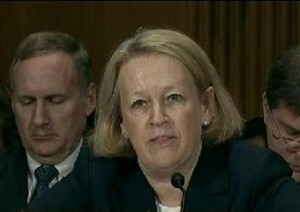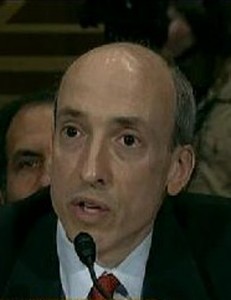By Pam Martens: May 22, 2012
If bank depositors were not sufficiently frightened to learn that JPMorgan Chase, the largest U.S. bank by assets, was using customers’ insured deposits as collateral to sell credit default insurance to hedge funds – the same dangerous derivatives maneuver that blew up AIG Financial Products and made the giant insurer a ward of the U.S. taxpayer – today’s U.S. Senate hearing added more reason for anxiety.
The hearing was convened from 10 a.m. to 12 noon by the U.S. Senate’s Committee on Banking, Housing and Urban Affairs to hear from Securities and Exchange Commission (SEC) Chair Mary Schapiro and Gary Gensler, Chair of the Commodity Futures Trading Commission (CFTC).
The two main regulators of the derivatives used by JPMorgan, that produced trading losses currently estimated by outside analysts at $3 billion to $5 billion, had to concede that they had no advance knowledge of the risky trades and learned about them from reading the newspaper.
The reason JPMorgan could operate in a black hole, is that the final rules governing derivative swaps have not been finalized by the regulators, thus Wall Street firms have not yet had to register as swap dealers. Only then can the SEC and CFTC carry out their oversight authority.
Making the black hole devoid of any regulatory sunshine, the trading took place in a unit of the bank not a unit of the broker-dealer or futures commission merchant currently overseen by the SEC and CFTC, respectively. The Office of the Comptroller of the Currency (OCC) oversees the banking operations of JPMorgan Chase and the Federal Reserve oversees its holding company.
In addition, the trading took place in a London office of JPMorgan Chase, far removed from the eyes of any U.S. regulator.
As the regulators answered questions and the Senators probed, the following alarm bells sounded:
It is now almost four years since the collapse of Lehman, Bear Stearns, AIG, Fannie Mae, Freddie Mac and the rescue of Citigroup and Merrill Lynch – all involving failed derivative trades; and yet dangerous derivative trading is still occurring at the country’s largest bank by assets, in a black hole away from the gaze of regulators, while Wall Street lobbies against regulation and sycophants in Congress join the chorus.
Equally alarming, four years after the near collapse of the U.S. financial system, regulators have become so fractured and siloed that they get their first warning of trouble from the press.
It is almost two years since the Dodd–Frank Wall Street Reform and Consumer Protection Act was passed by Congress, and yet the core reforms of that bill are still being discussed and debated and drafted. And that’s because managing one entity that is a bank, an investment bank, a retail brokerage firm, a futures merchant, a swaps and derivatives dealer and parent to 3,000 legal subsidiaries and affiliates spread from the Cayman Islands to Hong Kong and London is impossible to regulate. The mission assigned under Dodd-Frank is Mission Impossible.
Such financial institutions cannot hedge their risk. As happened with JPMorgan, its bets were so huge that it became the market in which it tried to hedge. Now, it cannot exit those positions. When one cannot exit a position, it is no longer a hedge, it is a death grip. The amount that JPMorgan has lost in its “hedge,” is one-sixth the size of what it has lost in its share price as a result of the loss of trust. It has suffered a credit downgrade and lost the confidence of Congress and its regulators. It is facing a wave of shareholder lawsuits that will further drain its coffers. It is under civil investigation by its regulators and a criminal probe by the FBI. Its Chairman and CEO, Jamie Dimon, has been called, once again, to explain the firm’s conduct to Congress.
And because JPMorgan has no liquid market in which to exit its losing trades, it cannot discuss with the public precisely what happened until it is free of those trades and must therefore watch anonymous sources leak the sorry details on a daily basis – creating a public relations’ nightmare for a banking concern that relies on customer trust.
As one Occupy Wall Street poster suggested on May Day in Manhattan, “Too Big Has Failed.” If the Senate wants to do something productive, it should stop grilling regulators over its own failed financial reform and restore the Glass-Steagall Act to separate commercial banking and insured depositors from the Wall Street speculators. The reason Congress passed the Glass-Steagall Act in 1933 was because it understood the siloing of regulators. It understood that Wall Street could not be stopped from gaming the system and the only means of protecting the safety and soundness of the U.S. financial system was to remove the ability of Wall Street to use bank deposits to gamble for the house.
Until this Congress comes to its senses, Wall Street will continue to run the country – into the ground.



